Glass Tupperware Meal Prep: Benefits and Insights
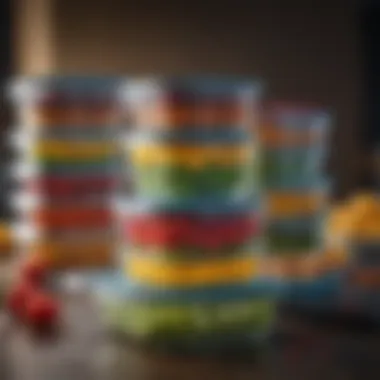
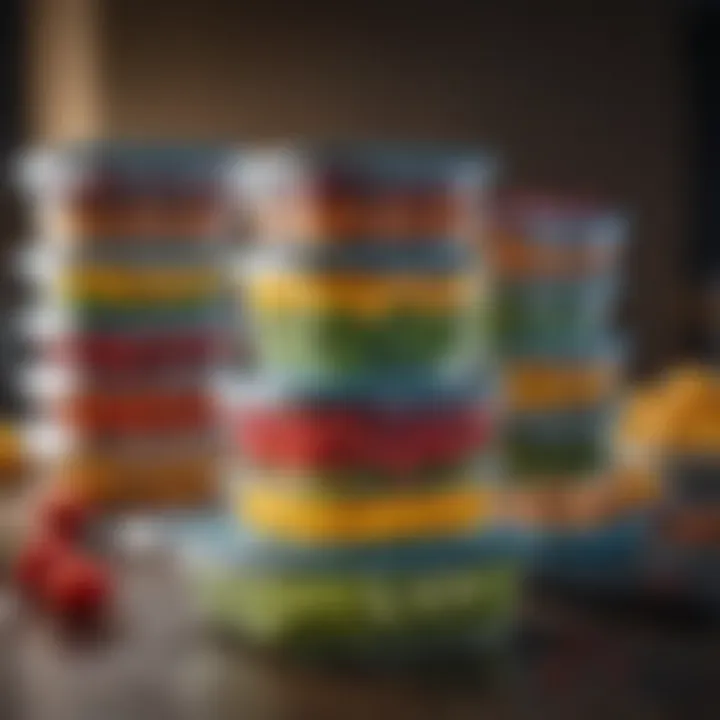
Intro
Meal prepping with glass Tupperware has gained popularity as a reliable method for maintaining a healthy lifestyle. Many health professionals, wellness coaches, nutritionists, fitness trainers, and mindfulness instructors recognize the importance of preparing meals ahead of time. Glass containers offer unique advantages over traditional plastic options. These benefits encompass health, storage, and sustainability.
In this guide, we will delve into the material properties of glass Tupperware, its health benefits, how to maximize storage efficiently, and its positive environmental impact. Understanding these facets can help individuals make informed decisions that support both personal health goals and broader sustainability objectives.
Certainly, selecting the right meal prep containers can significantly influence the effectiveness of a meal prep routine. Therefore, gaining comprehensive insights is essential. As we explore various aspects, readers will find practical advice tailored to enhance their meal prep strategies.
Understanding Glass Tupperware
The importance of understanding glass Tupperware extends beyond its aesthetic appeal. It serves as a practical solution for those who engage in meal prep. By grasping the essential components and advantages of glass containers, readers can make better decisions that contribute to health and sustainability. This section delves into the composition of glass containers and a comparative analysis between glass and plastic. This knowledge is crucial in recognizing why glass can be a preferable choice, especially in contexts of health and environmental impact.
Composition of Glass Containers
Glass containers are commonly made from silica sand, soda ash, and limestone. These raw materials undergo high-temperature melting to form a strong and durable material. Unlike plastic, glass does not leach chemicals into food. It is non-porous and does not retain odors or stains. This ensures that the flavor of food remains unaffected. Moreover, glass is recyclable, contributing positively to the environment.
Being made from natural minerals, glass is considered a sustainable material. Production processes have also improved over the years, with more companies focusing on reducing energy consumption and waste.
Comparative Analysis: Glass vs. Plastic
When assessing glass versus plastic Tupperware, several factors come into play:
- Chemical Safety: Glass is inert, meaning it doesn't interact with food. In contrast, certain plastics can leach harmful chemicals, especially when exposed to heat.
- Durability: Glass is more resistant to scratches and stains over time compared to plastic, which can degrade and discolor with use.
- Thermal Stability: Glass withstands fluctuations in temperature better than plastic. It can be used in the microwave, oven, or freezer without risk of warping.
In summary, adopting glass Tupperware can enhance both food safety and the meal prep experience. Understanding these basics allows individuals to appreciate the tactical advantages of integrating glass containers into their routines.
Advantages of Glass Tupperware for Meal Prep
Using glass Tupperware for meal preparation offers various advantages that significantly enhance the meal prep experience. These benefits span health, durability, cleaning ease, and overall practicality, making glass containers a preferred choice among many individuals focused on a healthier lifestyle. The characteristics of glass Tupperware not only support the aim of meal prepping but also align with broader health and environmental goals.
Health Benefits
Non-toxic Properties
Non-toxic properties of glass Tupperware play a crucial role in impacting overall health. Glass is made from natural materials, which means it does not contain harmful chemicals that are often present in plastic containers. Unlike some plastics, glass does not release harmful substances into food, especially when heated. This unique feature makes glass a great option for those looking to minimize their exposure to toxins present in other storage containers. Choosing non-toxic glass helps in maintaining a clean eating environment.
Reduction of Chemical Leaching
Another important aspect is the reduction of chemical leaching. Glass is inert, meaning it does not react with food or beverages. This property greatly reduces the risk of chemicals being absorbed into meals, unlike plastic containers which may release harmful additives. As a result, customers concerned about food safety will find this an essential benefit of using glass Tupperware. Minimizing exposure to chemical leaching supports smart meal prep choices, making it an appealing aspect of glass containers.
Durability and Longevity
Scratch Resistance
When it comes to durability, scratch resistance of glass Tupperware stands out. Unlike plastic, glass does not easily scratch or dent with regular use. This ensures that the appearance remains intact even after multiple uses. As a result, glass containers can maintain their aesthetic appeal over time. Investing in scratch-resistant containers saves costs in the long run since replacements will be less frequent.
Thermal Stability
Thermal stability is another critical factor to consider. Glass is capable of withstanding high temperatures, making it safe to transfer directly from the oven to the refrigerator without fear of damage. This stability adds convenience and allows for versatile use, such as reheating meals. Individuals seeking efficiency and safety in meal prep will greatly benefit from this unique characteristic, solidifying glass Tupperware as a reliable option for various meal-prepping routines.
Ease of Cleaning
Cleaning glass Tupperware is often straightforward and convenient. Most glass containers are dishwasher safe, thus reducing the effort required to maintain hygiene. Since glass does not retain stains or odors from food, cleaning becomes a breeze. Users appreciate this ease, complementing their commitment to healthy meal preparation with a practical solution. Overall, this ease of cleaning enhances the user experience, encouraging more frequent meal prepping.
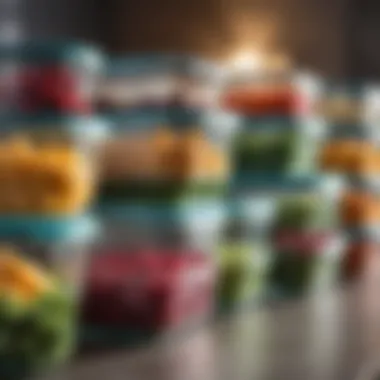
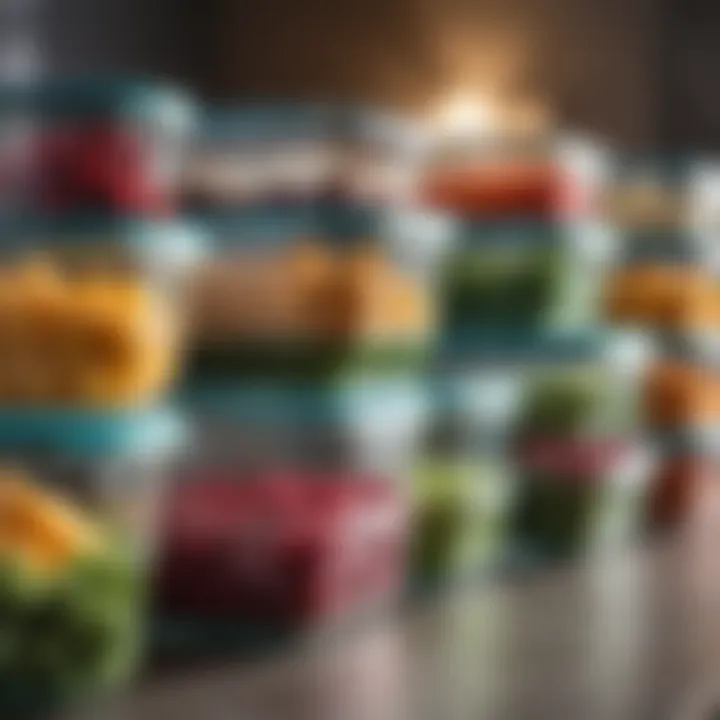
"Glass storage containers combine safety with practicality, making them an optimal choice for meal preparation."
In summary, the advantages offered by glass Tupperware extend beyond mere aesthetics. They encompass health-focused benefits, durability measures, and effortless cleaning processes. These features cater directly to the well-being of users, promoting a healthier and more sustainable lifestyle. Understanding these advantages is key for anyone exploring effective meal preparation options.
Optimizing Meal Prep with Glass Containers
Optimizing meal preparation with glass containers is essential for anyone looking to improve their cooking habits and maintain a balanced diet. Glass Tupperware offers unique advantages that can help streamline food preparation and encourage healthier eating patterns. Unlike plastic, glass containers do not absorb odors or stain easily, making them a great choice for meal prepping. With the right approaches, meal prep can become a more organized and efficient process.
Portion Control Strategies
Portion control is a critical aspect of meal prep. It not only helps in managing calorie intake but also encourages a stable diet over time. Glass containers often come in a variety of sizes, which can be utilized to create balanced meals. By measuring portions in glass containers, you can avoid the pitfalls of overeating while ensuring you meet your nutritional needs. A few tips for effective portion control include:
- Use different container sizes: Invest in a range of sizes, so you can mix and match meals throughout the week.
- Pre-portion your meals: Fill containers with specific servings at the time of cooking to avoid guesswork later.
These strategies make it easier to maintain portion sizes consistently, which is especially useful for those conscious about their energy intake.
Meal Variety and Customization
Customization is crucial in meal prepping. Tailoring meals to fit personal preferences enhances satisfaction and encourages adherence to meal plans.
Batch Cooking Techniques
Batch cooking is a popular method of preparing multiple meals at once. This technique allows individuals to cook larger quantities of food and store them for later use in glass containers. The key characteristic of batch cooking is efficiency. It minimizes cooking time and effort while maximizing the potential for nutrient retention. Some important benefits include:
- Time saving: Spend less time in the kitchen by cooking in bulk.
- Cost-effective: Buy ingredients in larger quantities, often at lower prices.
However, there are minor drawbacks, such as needing adequate storage space and familiarity with different cooking methods to preserve flavors and nutrients.
Seasonal Ingredient Usage
Incorporating seasonal ingredients is another effective strategy to optimize meal prep. Seasonal foods offer better taste and nutritional value due to their ripeness and freshness. This practice also supports local agriculture, making it a popular choice among conscious consumers.
Benefits of seasonal ingredient usage include:
- Nutritional benefits: Fresh produce retains more nutrients compared to out-of-season options.
- Variety in meals: Seasonal ingredients can bring novelty to meal prep, preventing the monotony that often leads to meal fatigue.
Utilizing seasonal ingredients in meal prep adds unique flavors and textures to dishes while being environmentally conscious.
By optimizing meal prep with glass containers, you can enjoy better quality, healthier meals tailored to your preferences while supporting sustainable practices.
Selecting the Right Glass Tupperware
Selecting glass Tupperware for meal prep is a critical aspect of achieving both efficiency and health benefits in the kitchen. The right glass containers can significantly enhance your meal planning experience. They can reduce food waste, maintain food freshness, and help you adhere to portion control. Knowing what type of glass Tupperware fits your lifestyle and requirements ensures that your meal prep routine is practical and effective.
Types of Glass Containers
Storage Options
Glass containers for storage are varied and can cater to different needs. There are options like food storage containers, baking dishes, and jars that can all be used in meal prep. The key characteristic of these storage options is their versatility.
- Advantages: They can transition from the refrigerator to the microwave seamlessly. This makes them suitable for reheating items without needing to transfer food to another dish.
- Unique Feature: Many storage options come with airtight lids, which keep food fresh for extended periods.
- Disadvantages: Some may find glass containers heavier than plastic alternatives.
Thus, selecting a glass container that suits your storage needs is essential for ensuring convenience and practicality in meal prep.
Food-Safe Features
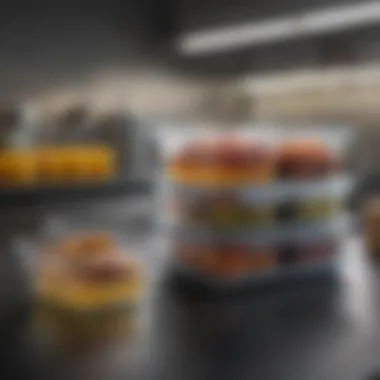
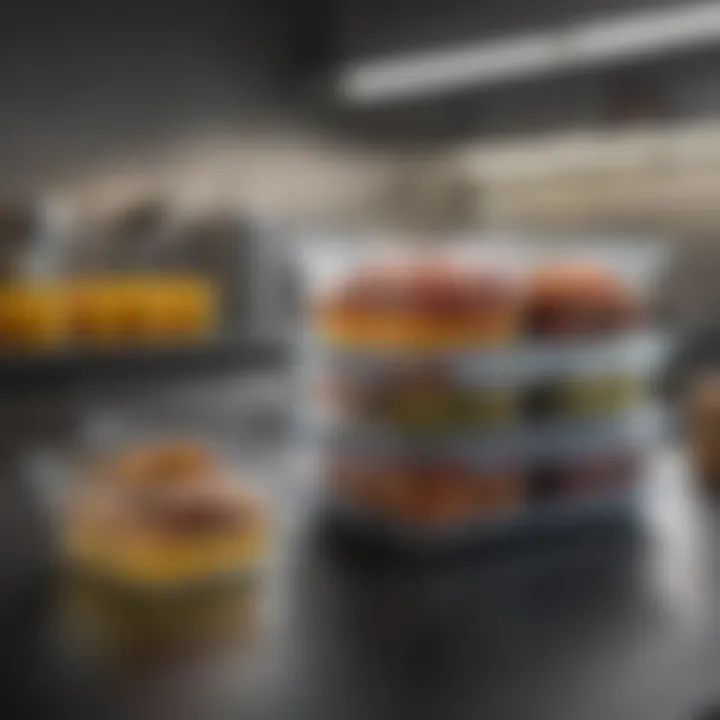
Food-safe glass Tupperware offers assurance regarding the safety of the materials used. A notable attribute is that many glass containers are made from borosilicate or tempered glass, which are more resistant to temperature changes. This quality is crucial in meal prep as it prevents cracking or shattering during use.
- Advantages: These materials are non-reactive, meaning they do not leach harmful chemicals into food as some plastics might. This makes them an ideal choice for health-conscious individuals.
- Unique Feature: Many food-safe glass containers are designed to be microwave, oven, and dishwasher safe.
- Disadvantages: Some less durable options might not withstand high heat, so it is necessary to check the specifications.
Overall, focusing on food-safe features ensures that you are making a sound choice for both your health and your family.
Sizing and Shapes
Understanding the sizing and shape of glass Tupperware is essential for meal prep. Different shapes can help optimize storage space and enhance the presentation of meals. Choosing the right sizes allows for efficient portion control, encouraging healthy eating habits. Containers suitable for salads, main courses, or snacks must be part of your collection to cater to various meal types.
Eco-Friendly Considerations
The integration of glass Tupperware in meal prep is not merely a trend but a step towards a more sustainable lifestyle. This section explores the eco-friendly considerations surrounding glass containers, highlighting the environmental advantages and the implications of their widespread use. Glass Tupperware offers a compelling alternative to its plastic counterparts, particularly in the realms of sustainability and environmental consciousness.
Sustainability in Glass Production
The production of glass involves raw materials such as sand, soda ash, and limestone. One significant aspect of glass sustainability is its relatively low energy requirement compared to other materials after the initial processing phase. According to several studies, recycling glass can save up to 30% of energy compared to producing new glass from raw materials. This means less strain on natural resources, lower emissions of greenhouse gases, and a more responsible approach toward consumption.
In addition to energy savings, glass is endlessly recyclable. It can be melted down and reshaped without loss of quality, making it a viable option for reducing waste. It's important to note that using recycled materials in glass production further lessens environmental impacts while decreasing reliance on virgin materials. As a result, incorporating glass Tupperware in meal prep aligns with a commitment to responsible choices and sustainability.
Reusability and Recycling
One of the most significant advantages of glass Tupperware is its reusability. Unlike single-use plastics, glass containers are designed to endure. They can be used over and over, which contributes to reduced waste. This is especially relevant in a society increasingly focused on minimizing its ecological footprint.
"Using glass instead of plastic is a direct way to reduce toxins entering our ecosystem and improve our health outcomes."
Recycling glass is straightforward. When disposed of correctly, glass containers can be collected and processed into new products. A practical approach is to encourage consumers to return glass to recycling centers. This adds a layer of accountability to the recycling process.
To enhance reusability:
- Opt for high-quality glass containers that withstand thermal shock.
- Avoid overloading the containers to prolong their lifespan.
- Store foods less likely to stain or impart odors, thereby preserving their functionality.
In summary, the eco-friendly considerations associated with glass Tupperware bring forth essential elements like sustainability in production, reusability, and the ability to recycle. By making informed choices, individuals can endorse a system that promotes environmental responsibility, which resonates with health professionals, nutritionists, and the broader community seeking to improve their lifestyle.
Common Misconceptions About Glass Tupperware
Understanding glass Tupperware is crucial for making informed choices about meal prep. Several misconceptions can discourage individuals from adopting this healthier and environmentally friendly option. Clarifying these misconceptions will help readers appreciate the practicality and benefits of using glass containers in their meal prep routines.
Safety Concerns
One of the significant concerns people have regarding glass Tupperware is safety. Many assume that glass is prone to breaking and, therefore, poses a risk. It is true that glass can break, but modern glass containers are designed with durability in mind. High-quality glass containers, like those from brands such as Pyrex and Anchor Hocking, are often made of borosilicate glass or tempered glass, which is more resistant to thermal shock.
Additionally, unlike plastics, glass does not leach harmful chemicals into food. This property is particularly important for those concerned about chemical exposure. With glass, there is less worry about substances like BPA, which is often found in plastic containers. Choosing glass containers represents a safer choice for meal storage.
Weight and Portability
Another common misconception is that glass Tupperware is too heavy and not practical for on-the-go lifestyles. While glass may be denser than plastic, the advantages often outweigh the disadvantages. High-quality glass containers have been designed with portability in mind. Some models are lightweight and come with plastic lids that enhance their ease of transport.
In fact, many consumers find that the weight of glass actually provides a sense of sturdiness and quality that lighter materials like plastic do not offer. When packed correctly, glass containers can easily fit into bags or lunch boxes without causing issues. Moreover, the benefits of using glass—such as heat retention and preservation of food quality—further justify any minor inconvenience regarding their weight.
"The durability and safety of glass Tupperware make it a preferred option for health-conscious individuals."
Integrating Glass Tupperware into Your Lifestyle
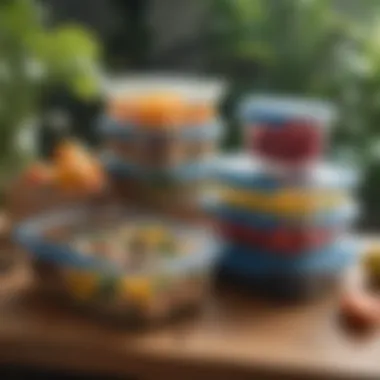
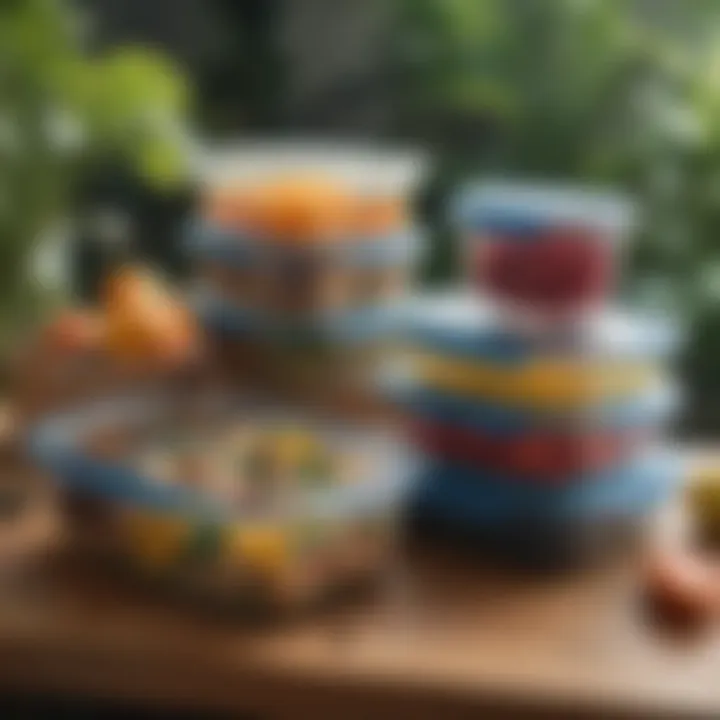
Integrating glass Tupperware into your daily life involves more than just switching containers. It addresses meal prep frequency and planning, as well as how you can harmoniously incorporate glass containers into your routines. Understanding the nuances of your schedule and dietary preferences is vital. This section aims to guide you in positioning glass Tupperware as an essential element of your meal preparation process.
Meal Prep Frequency and Planning
When it comes to meal prep, frequency is key. Many health professionals recommend dedicated time each week to plan and prepare meals using glass Tupperware. This not only simplifies your dietary choices but also aids in portion control. Generally, allocating a few hours over the weekend for meal prep allows you to efficiently utilize your time.
Some practical tips include:
- Choose a Consistent Day: Designate a specific day that works for you, perhaps Sunday, to prep meals for the week ahead.
- Plan a Menu: Create a balanced menu that emphasizes nutritious ingredients. Your glass containers can be used to store various items like grains, proteins, and vegetables.
- Batch Cooking: Prepare large quantities of a few dishes. This allows variety while maximizing use of your cooking time.
Additionally, keep in mind that glass containers are microwave and oven safe, making reheating a simpler task post-preparation. Planning ahead can alleviate stress during busy weekdays and help you stick to your health goals.
Incorporating into Weekly Routines
To comfortably incorporate glass Tupperware into your life, consider your weekly eating habits and schedule. Start by organizing your kitchen to ensure that these containers are accessible. Keeping them within reach encourages consistent meal prep.
Create a weekly routine that includes:
- Schedule Reminders: Set alerts on your phone or calendar to remind you of meal prep times. This will reinforce the habit over time.
- Create a Grocery List: Use your meal plan to guide your grocery shopping, ensuring that glass Tupperware is filled with quality ingredients.
- Engage Family Members or Housemates: Involving others can make meal prep a shared responsibility. This not only fosters connection but also allows for diverse meal options.
Incorporating these steps into your routine can make adopting glass Tupperware feel seamless. Over time, it becomes natural to prioritize nutritious meals while minimizing reliance on food delivery or takeout.
"Meal prepping with glass Tupperware supports a healthier lifestyle while promoting sustainability."
Embracing glass Tupperware enhances meal prep efficiency and aligns with a more mindful approach to eating. Consider how these strategies can be perceived within your lifestyle to foster habits that contribute to overall well-being.
Caring for Glass Tupperware
Caring for glass Tupperware is crucial for maintaining its functionality and longevity. Unlike plastic containers, which can warp or stain, glass Tupperware provides a robust option free from chemical leaching. Learning the best practices for cleaning and storage can help maximize their lifespan, ensuring they remain a safe and effective choice for meal prep.
Cleaning Techniques
For cleaning glass Tupperware, specific techniques can enhance both ease and effectiveness. Here are some recommended methods:
- Hand Washing: Use warm water with mild dish soap. A soft sponge will prevent scratching while effectively removing food residues.
- Dishwasher Use: Many glass containers are dishwasher safe. Ensure that they are placed on the top rack to avoid thermal shock.
- Baking Soda Paste: For stubborn stains, a paste of baking soda and water can be applied. Let it sit for a few hours before rinsing off.
- Vinegar Soak: If odors persist, soaking in a mix of vinegar and water can neutralize smells and refresh the container.
Best Practices for Storage
Proper storage of glass Tupperware is essential for preserving both its physical integrity and your food. Follow these best practices to enhance storage efficiency:
- **Avoid Stacking **: When possible, store glass containers without stacking, as this can lead to scratches and chips.
- Lid On or Off: Keep the lids off when storing in a closed cabinet to allow for airflow and to avoid any potential odors.
- Temperature Variation: Avoid drastic changes in temperature. Do not move containers directly from the freezer to the oven, as this could crack the glass.
- Keep Organized: Utilize clear bins or designated shelves to keep all glass containers in an orderly fashion. This method not only saves time but also protects your glassware from accidental damage.
"Proper care not only preserves your glass Tupperware but ensures it remains a safe choice for food storage."
In fencing glass Tupperware, these steps ensure that your containers perform to their best potential while supporting a sustainable lifestyle. As you embrace glass in your meal preparation, thoughtful care adds to its longevity.
Culmination: Embracing Glass in Meal Prep
In a world where convenience often overshadows health, embracing glass Tupperware for meal prep represents a conscious shift towards better eating habits and sustainability. Choosing glass containers over plastic not only elevates the health standards of stored food but also contributes positively to environmental efforts.
One of the foremost benefits of glass Tupperware is its non-toxic nature. Unlike plastic, glass does not release harmful chemicals when exposed to heat or when in contact with acidic foods. This quality is crucial for maintaining the integrity of meals, ensuring they remain healthy and safe to consume. Consumers are increasingly concerned about chemical leaching, highlighting the importance of opting for non-toxic storage solutions.
Glass containers also offer durability and longevity. They are less prone to scratches and do not stain as easily as plastic. This characteristic makes glass Tupperware a wise long-term investment. Thermal stability is another asset, allowing glass to withstand high and low temperatures without compromising its structure. This versatility means glass containers can go from the oven to the refrigerator seamlessly.
In addition to health and durability factors, glass Tupperware is also eco-friendly. Many options are made from recycled materials and are fully recyclable themselves, which aligns with the growing trend of sustainability. By investing in glass Tupperware, individuals participate in reducing plastic waste.
Furthermore, the aesthetic appeal of glass containers cannot be overlooked. They come in various sizes and shapes, fitting easily into modern kitchen designs. They allow users to see the contents at a glance, making meal planning more straightforward and visually pleasing.
When integrating glass Tupperware into meal prep routines, planning frequency and meal variety prove significant. Preparing meals ahead of time not only saves time during busy weekdays but also promotes healthier eating habits. With glass containers, one can explore diverse recipes and fresh ingredients, thus enhancing the nutrition profile of meals prepared in advance.
Overall, embracing glass Tupperware for meal prep is more than just a trend; it is a commitment to healthier living and eco-conscious choices. Whether for health professionals, wellness coaches, or individuals aiming for a more mindful lifestyle, incorporating glass containers into daily routines delivers significant benefits. By prioritizing quality materials, one supports both personal health and environmental sustainability, making a positive impact on both fronts.







